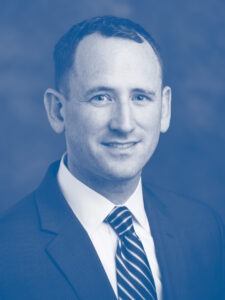Earlier this month, Eitan Hersh released a series of studies with the Jim Joseph Foundation focused on college students and the Israel-Hamas War. The research provides new insights on the ways October 7 and the rise of antisemitism have affected Jewish college students. The studies include survey responses from Jewish college students who also participated in a study conducted by Hersh in 2022, giving it a more focused lens on the recent changes to the experience of Jewish college students. We appreciate the rigor and quality of Hersh’s work, and interviewed him to get some insight into his process and observations.
Berman Archive: Tell us about yourself, your background, your current affiliations, and your research interests.
Eitan Hersh: I’m currently a professor at Tufts University, just outside Boston. I’m a political scientist. I specialize in quantitative studies of US voting and civic behavior. My research is mostly about elections, but I dabble in all sorts of topics, including business leadership in politics, health care, religion, and more. Starting about five years ago, I have developed a strong interest in studying antisemitism and Jewish life in America.
How do you hope your work informs or influences Jewish communal organizations?
Jewish community organizations can benefit from a.) more quantitative analysis (e.g., surveys, experiments, social media data, etc) and b.) more work from independent scholars who just want to get the answer right. Coming from studying politics, I sometimes still see campaigns or political organizations that can make investment decisions based on hunches alone or in which decision-making is clouded by ideological commitments. In that world, it’s good to have independent scholars try to test those hunches! Similarly, in the Jewish world, I think that this kind of approach is necessary too.
More specifically related to my work on antisemitism, I would say that this is a particular area where quantitative studies are helpful. That’s because people with different agendas often talk past each other by looking at different pieces of anecdotal evidence. Here, I can do a study and we can all talk about the same results. And if someone doesn’t like the approach I took and think a different approach would lead to a different result, that’s great! Let’s do that study too!
As Jewish students are growing up and discovering more about who they are and what they believe, they are not necessarily viewing Israel through a primarily Jewish lens. They might approach Israel through more of a political lens, a social justice lens, a racial justice lens. We just see a lot of variety in the experience of Jewish-identifying students.
You’ve just completed some research about college students and the Israel-Hamas war with the Jim Joseph Foundation, so we want to ask you about it:
Part I examined social tensions that emerged as a result of the war. How do you read the shifts your found now as compared to your work from a few years ago?.
The shifts are pretty dramatic. Even back in 2022, when I did the initial study of Jewish college students, about 1 in 5 students were saying they hide their Jewish identity to fit in on campus and that they are judged negatively for attending Jewish activities. When we studied this again this year, it’s twice as many Jewish students who feel that way. We don’t yet know whether this is a temporary change because campus tensions are particularly high right now or whether it’s more permanent. But we’ll be surveying again at the end of the school year to find out more.
Part 2 focuses on the responses of Jewish students to the war. What surprised you about what they reported?
There are lots of interesting findings here. One that sticks with me is that Jewish students feel social tension when they enter Jewish spaces this year more than in the past. At first, that might seem like an odd finding. After all, Jewish spaces are a refuge for students on campus, so why would they feel any tensions? Even more, the students in the survey are generally quite happy with how Hillels and other campus organizations have responded to the Hamas war, and attendance is way up. So what’s going on? I think the answer is that even among Jewish students, there is a wide range of views on the war (likely a much wider range than in adult Jewish spaces such as synagogues). And the war is a constant topic of conversation. So, attending Shabbat dinner or another program, a student might both be happy to be in this warm inviting space but the student also might think, “I might get into yet another debate about Israel.”
How do you think your work fits in with longer trends in the study of American Jewish relationships to Israel?
It’s always hard to figure out where we are in terms of historical change. But we see a few things happening at once. We know that young people in general have shifted against Israel. Outside the Jewish community, young Americans essentially view Israel as an enemy state, according to my research. Inside the Jewish community, young people don’t see it that way, but they do view Israel in a more critical light than older people. We also know that younger Jews come to college with a wide variety of backgrounds. Many have had little exposure to Jewish life. Some of these students view Israel mainly through a political lens rather than through a cultural, ethnic, or religious lens.
As Jewish students are growing up and discovering more about who they are and what they believe, they are not necessarily viewing Israel through a primarily Jewish lens. They might approach Israel through more of a political lens, a social justice lens, a racial justice lens. We just see a lot of variety in the experience of Jewish-identifying students.
At the same time, October 7 and the war seem like they might have changed things, at least for a segment of the Jewish community. Jewish students have, in fact, moved toward a “pro-Israel” position this year. On average, the students feel closer to their Jewish identity, according to the survey. They are attending Jewish events more. And so we might start to see longer term changes for how students position themselves socially and politically. For Jewish students who believe that the Jewish people need Israel, will terms like “leftist” or “social justice” continue to be terms that they can identify positively with? They’ve seen peers who adopt those terms chanting “intifada” and celebrating October 7. I think that’s going to leave a long term impression on them.
What’s next for you on the research front?
In terms of research related to the Jewish community, I’m developing a new method that can be used to survey American Jews, including narrow subsets such as Jews under 30 or Jews within small geographic areas. The same methodology could also be used by organizations to target outreach. It’s pretty exciting research that will have lots of practical uses for Jewish organizations and researchers. But we’re still a little while away from sharing more.
On my broader political science research, I continue to work on topics about election laws and their effects on voters and about the changing relationship between businesses and political advocacy.

